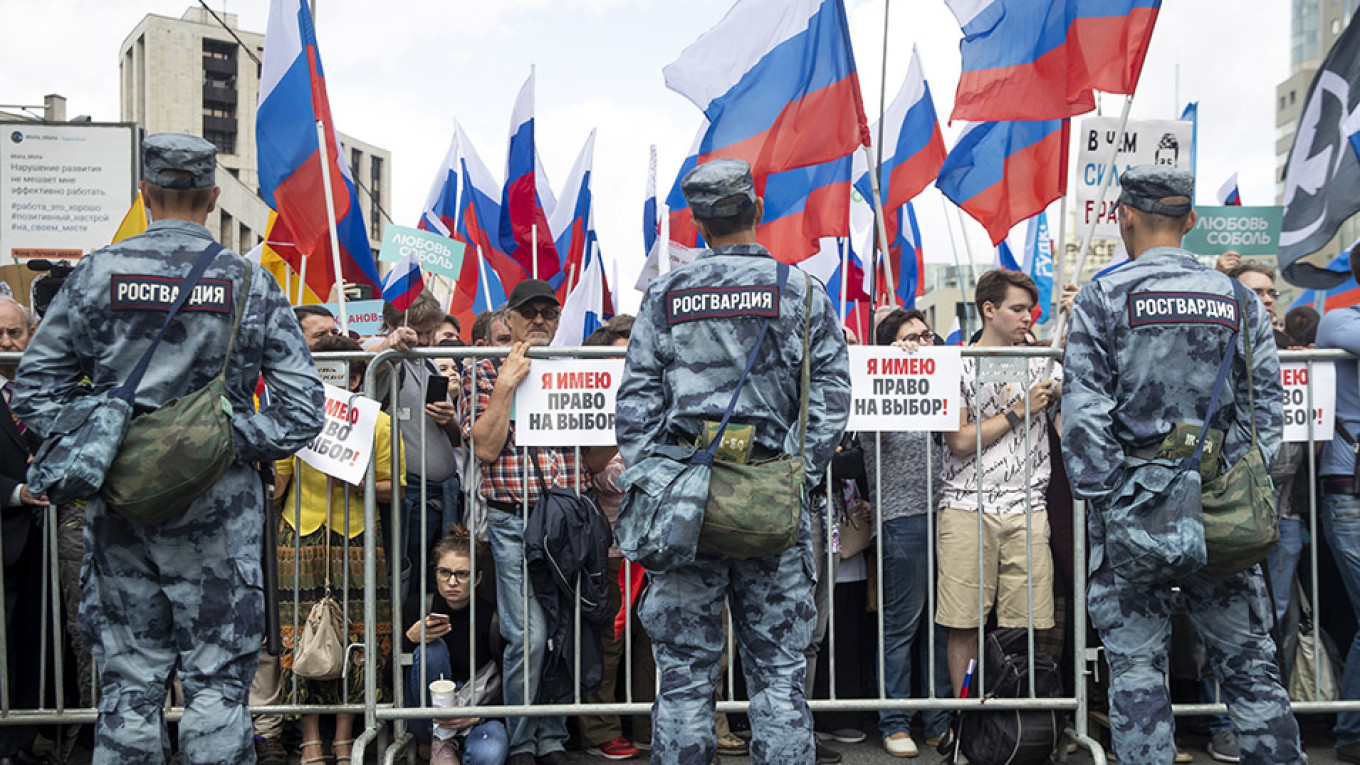A lot has happened in 2019 — nowhere moreso than in Russia, where geopolitical drama, civil unrest, natural disasters and more played out across the country.
As we approach 2020, here’s a look at the stories and events that shaped the narrative across Russia this year:
Summer of discontent
This summer saw a nearly unprecedented wave of protests across the country despite government restrictions on protest activity as Russians grew increasingly dissatisfied with the status quo.
The June arrest of Ivan Golunov, an anti-corruption reporter for the Meduza news website, on large-scale drug trafficking charges sparked a widespread public outcry, with his supporters and colleagues claiming the accusations were fabricated as payback for his reporting. Hundreds of people were detained at a Moscow protest in support of Golunov. The case against the journalist was dropped days later in a shock court decision that acknowledged the evidence against him was inauthentic.

Later that month, Moscow authorities’ refusal to allow opposition candidates on the City Duma ballot kicked off weeks of mass protests for fair and open elections in the capital. The protests, which saw tens of thousands of people attending at their peak, were the largest anti-government rallies since a wave of anti-Putin rallies in 2011-2012. After thousands of protesters were detained, the protests evolved into rallies against the authorities’ heavy-handed response.
The arrests of about a dozen protesters on “mass unrest” charges sparked a nationwide campaign in their support, with critics calling the arrests arbitrary and politically motivated.
Reach into Africa
Russia pushed further into Africa this year in an effort to increase its influence across the continent through military, economic and energy cooperation.
The intensified push was evident at the first Russia-Africa Summit in Sochi, which was attended by 43 African heads of state and led to billions of dollars of new agreements being signed.
At the same time, reports pointed to the widening presence of Russian mercenaries on the continent linked to Wagner, a military contractor owned by “Putin’s chef” Yevgeny Prigozhin. Wagner fighters have been reported to be fighting alongside opposition forces in Libya’s conflict as well as helping Mozambique government forces target Islamic insurgents.
Nuclear explosion in Arkhangelsk
A mysterious nuclear accident at a military testing site in the Arkhangelsk region killed five nuclear specialists, injured several other people and sparked suspicions after nearby cities recorded a spike in radiation.

The incident was shrouded in mystery as information was dispersed incoherently and slowly, and observers compared the government’s secrecy regarding the accident to the Soviet handling of the Chernobyl nuclear disaster in 1986. Doctors who treated the victims said they hadn’t been warned that their patients were nuclear accident victims. Russian officials maintained that the explosion was the result of a failed test of an “isotope power source for a liquid-fuelled rocket engine.”
Western experts speculated that the explosion was actually the result of a mission to salvage a nuclear-powered cruise missile from the bottom of the sea, while others believed it to be a consequence of a Burevestnik cruise missile test.
Ice and fire
The effects of climate change in Russia became more acute this year, with unprecedented levels of ice erosion in the Arctic through melting permafrost and devastating wildfires in Siberia.
Forest fires raged across Siberia this summer, covering an area the size of Belgium and causing at least $100 million worth of damage at their worst, as many decried the government’s response. Meanwhile, ice coverage in Russia’s Arctic fell to record lows amid abnormally high temperatures, pushing polar bears south into human settlements.
Russia, the world’s fourth-largest greenhouse gas emitter, this year ratified the 2015 Paris climate agreement. However, the government later watered down a package of climate change legislation over pushback from the country’s leading businesses.
Ukraine detente
Signs of a slow improvement in relations between Russia and its neighbor Ukraine began to appear this year after the election of new Ukrainian President Volodymyr Zelenskiy this spring.
Zelenskiy had made ending the five-year conflict between Ukrainian forces and pro-Russian separatists in eastern Ukraine that has killed over 13,000 people a key campaign promise.
The swap of 70 prisoners between the two sides in September signaled a potential thaw in relations that have been frozen since 2014, when Russia annexed Crimea and began to show support for separatists in eastern Ukraine. Moscow later returned three Ukrainian naval ships it had captured in the Kerch Strait to Kiev.
In Putin’s first face-to-face meeting with Zelenskiy in December, the two presidents agreed on a new all-for-all prisoner exchange and made a renewed commitment to implementing a 2015 ceasefire agreement in eastern Ukraine.
